Hongjin Su
Kimi K2.5: Visual Agentic Intelligence
Feb 02, 2026Abstract:We introduce Kimi K2.5, an open-source multimodal agentic model designed to advance general agentic intelligence. K2.5 emphasizes the joint optimization of text and vision so that two modalities enhance each other. This includes a series of techniques such as joint text-vision pre-training, zero-vision SFT, and joint text-vision reinforcement learning. Building on this multimodal foundation, K2.5 introduces Agent Swarm, a self-directed parallel agent orchestration framework that dynamically decomposes complex tasks into heterogeneous sub-problems and executes them concurrently. Extensive evaluations show that Kimi K2.5 achieves state-of-the-art results across various domains including coding, vision, reasoning, and agentic tasks. Agent Swarm also reduces latency by up to $4.5\times$ over single-agent baselines. We release the post-trained Kimi K2.5 model checkpoint to facilitate future research and real-world applications of agentic intelligence.
MMTEB: Massive Multilingual Text Embedding Benchmark
Feb 19, 2025Abstract:Text embeddings are typically evaluated on a limited set of tasks, which are constrained by language, domain, and task diversity. To address these limitations and provide a more comprehensive evaluation, we introduce the Massive Multilingual Text Embedding Benchmark (MMTEB) - a large-scale, community-driven expansion of MTEB, covering over 500 quality-controlled evaluation tasks across 250+ languages. MMTEB includes a diverse set of challenging, novel tasks such as instruction following, long-document retrieval, and code retrieval, representing the largest multilingual collection of evaluation tasks for embedding models to date. Using this collection, we develop several highly multilingual benchmarks, which we use to evaluate a representative set of models. We find that while large language models (LLMs) with billions of parameters can achieve state-of-the-art performance on certain language subsets and task categories, the best-performing publicly available model is multilingual-e5-large-instruct with only 560 million parameters. To facilitate accessibility and reduce computational cost, we introduce a novel downsampling method based on inter-task correlation, ensuring a diverse selection while preserving relative model rankings. Furthermore, we optimize tasks such as retrieval by sampling hard negatives, creating smaller but effective splits. These optimizations allow us to introduce benchmarks that drastically reduce computational demands. For instance, our newly introduced zero-shot English benchmark maintains a ranking order similar to the full-scale version but at a fraction of the computational cost.
Learn-by-interact: A Data-Centric Framework for Self-Adaptive Agents in Realistic Environments
Jan 18, 2025



Abstract:Autonomous agents powered by large language models (LLMs) have the potential to enhance human capabilities, assisting with digital tasks from sending emails to performing data analysis. The abilities of existing LLMs at such tasks are often hindered by the lack of high-quality agent data from the corresponding environments they interact with. We propose Learn-by-interact, a data-centric framework to adapt LLM agents to any given environments without human annotations. Learn-by-interact synthesizes trajectories of agent-environment interactions based on documentations, and constructs instructions by summarizing or abstracting the interaction histories, a process called backward construction. We assess the quality of our synthetic data by using them in both training-based scenarios and training-free in-context learning (ICL), where we craft innovative retrieval approaches optimized for agents. Extensive experiments on SWE-bench, WebArena, OSWorld and Spider2-V spanning across realistic coding, web, and desktop environments show the effectiveness of Learn-by-interact in various downstream agentic tasks -- baseline results are improved by up to 12.2\% for ICL with Claude-3.5 and 19.5\% for training with Codestral-22B. We further demonstrate the critical role of backward construction, which provides up to 14.0\% improvement for training. Our ablation studies demonstrate the efficiency provided by our synthesized data in ICL and the superiority of our retrieval pipeline over alternative approaches like conventional retrieval-augmented generation (RAG). We expect that Learn-by-interact will serve as a foundation for agent data synthesis as LLMs are increasingly deployed at real-world environments.
Spider 2.0: Evaluating Language Models on Real-World Enterprise Text-to-SQL Workflows
Nov 12, 2024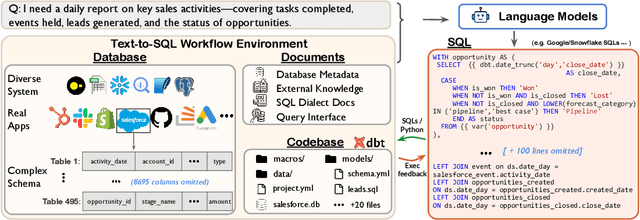

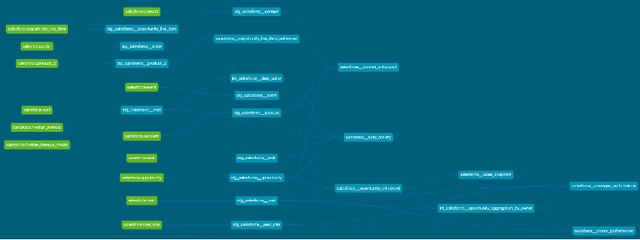

Abstract:Real-world enterprise text-to-SQL workflows often involve complex cloud or local data across various database systems, multiple SQL queries in various dialects, and diverse operations from data transformation to analytics. We introduce Spider 2.0, an evaluation framework comprising 632 real-world text-to-SQL workflow problems derived from enterprise-level database use cases. The databases in Spider 2.0 are sourced from real data applications, often containing over 1,000 columns and stored in local or cloud database systems such as BigQuery and Snowflake. We show that solving problems in Spider 2.0 frequently requires understanding and searching through database metadata, dialect documentation, and even project-level codebases. This challenge calls for models to interact with complex SQL workflow environments, process extremely long contexts, perform intricate reasoning, and generate multiple SQL queries with diverse operations, often exceeding 100 lines, which goes far beyond traditional text-to-SQL challenges. Our evaluations indicate that based on o1-preview, our code agent framework successfully solves only 17.0% of the tasks, compared with 91.2% on Spider 1.0 and 73.0% on BIRD. Our results on Spider 2.0 show that while language models have demonstrated remarkable performance in code generation -- especially in prior text-to-SQL benchmarks -- they require significant improvement in order to achieve adequate performance for real-world enterprise usage. Progress on Spider 2.0 represents crucial steps towards developing intelligent, autonomous, code agents for real-world enterprise settings. Our code, baseline models, and data are available at https://spider2-sql.github.io.
BRIGHT: A Realistic and Challenging Benchmark for Reasoning-Intensive Retrieval
Jul 16, 2024



Abstract:Existing retrieval benchmarks primarily consist of information-seeking queries (e.g., aggregated questions from search engines) where keyword or semantic-based retrieval is usually sufficient. However, many complex real-world queries require in-depth reasoning to identify relevant documents that go beyond surface form matching. For example, finding documentation for a coding question requires understanding the logic and syntax of the functions involved. To better benchmark retrieval on such challenging queries, we introduce BRIGHT, the first text retrieval benchmark that requires intensive reasoning to retrieve relevant documents. BRIGHT is constructed from the 1,398 real-world queries collected from diverse domains (such as economics, psychology, robotics, software engineering, earth sciences, etc.), sourced from naturally occurring or carefully curated human data. Extensive evaluation reveals that even state-of-the-art retrieval models perform poorly on BRIGHT. The leading model on the MTEB leaderboard [38 ], which achieves a score of 59.0 nDCG@10,2 produces a score of nDCG@10 of 18.0 on BRIGHT. We further demonstrate that augmenting queries with Chain-of-Thought reasoning generated by large language models (LLMs) improves performance by up to 12.2 points. Moreover, BRIGHT is robust against data leakage during pretraining of the benchmarked models as we validate by showing similar performance even when documents from the benchmark are included in the training data. We believe that BRIGHT paves the way for future research on retrieval systems in more realistic and challenging settings. Our code and data are available at https://brightbenchmark.github.io.
ARKS: Active Retrieval in Knowledge Soup for Code Generation
Feb 19, 2024Abstract:Recently the retrieval-augmented generation (RAG) paradigm has raised much attention for its potential in incorporating external knowledge into large language models (LLMs) without further training. While widely explored in natural language applications, its utilization in code generation remains under-explored. In this paper, we introduce Active Retrieval in Knowledge Soup (ARKS), an advanced strategy for generalizing large language models for code. In contrast to relying on a single source, we construct a knowledge soup integrating web search, documentation, execution feedback, and evolved code snippets. We employ an active retrieval strategy that iteratively refines the query and updates the knowledge soup. To assess the performance of ARKS, we compile a new benchmark comprising realistic coding problems associated with frequently updated libraries and long-tail programming languages. Experimental results on ChatGPT and CodeLlama demonstrate a substantial improvement in the average execution accuracy of ARKS on LLMs. The analysis confirms the effectiveness of our proposed knowledge soup and active retrieval strategies, offering rich insights into the construction of effective retrieval-augmented code generation (RACG) pipelines. Our model, code, and data are available at https://arks-codegen.github.io.
Generative Representational Instruction Tuning
Feb 15, 2024



Abstract:All text-based language problems can be reduced to either generation or embedding. Current models only perform well at one or the other. We introduce generative representational instruction tuning (GRIT) whereby a large language model is trained to handle both generative and embedding tasks by distinguishing between them through instructions. Compared to other open models, our resulting GritLM 7B sets a new state of the art on the Massive Text Embedding Benchmark (MTEB) and outperforms all models up to its size on a range of generative tasks. By scaling up further, GritLM 8x7B outperforms all open generative language models that we tried while still being among the best embedding models. Notably, we find that GRIT matches training on only generative or embedding data, thus we can unify both at no performance loss. Among other benefits, the unification via GRIT speeds up Retrieval-Augmented Generation (RAG) by > 60% for long documents, by no longer requiring separate retrieval and generation models. Models, code, etc. are freely available at https://github.com/ContextualAI/gritlm.
OpenAgents: An Open Platform for Language Agents in the Wild
Oct 16, 2023



Abstract:Language agents show potential in being capable of utilizing natural language for varied and intricate tasks in diverse environments, particularly when built upon large language models (LLMs). Current language agent frameworks aim to facilitate the construction of proof-of-concept language agents while neglecting the non-expert user access to agents and paying little attention to application-level designs. We present OpenAgents, an open platform for using and hosting language agents in the wild of everyday life. OpenAgents includes three agents: (1) Data Agent for data analysis with Python/SQL and data tools; (2) Plugins Agent with 200+ daily API tools; (3) Web Agent for autonomous web browsing. OpenAgents enables general users to interact with agent functionalities through a web user interface optimized for swift responses and common failures while offering developers and researchers a seamless deployment experience on local setups, providing a foundation for crafting innovative language agents and facilitating real-world evaluations. We elucidate the challenges and opportunities, aspiring to set a foundation for future research and development of real-world language agents.
Lemur: Harmonizing Natural Language and Code for Language Agents
Oct 10, 2023Abstract:We introduce Lemur and Lemur-Chat, openly accessible language models optimized for both natural language and coding capabilities to serve as the backbone of versatile language agents. The evolution from language chat models to functional language agents demands that models not only master human interaction, reasoning, and planning but also ensure grounding in the relevant environments. This calls for a harmonious blend of language and coding capabilities in the models. Lemur and Lemur-Chat are proposed to address this necessity, demonstrating balanced proficiencies in both domains, unlike existing open-source models that tend to specialize in either. Through meticulous pre-training using a code-intensive corpus and instruction fine-tuning on text and code data, our models achieve state-of-the-art averaged performance across diverse text and coding benchmarks among open-source models. Comprehensive experiments demonstrate Lemur's superiority over existing open-source models and its proficiency across various agent tasks involving human communication, tool usage, and interaction under fully- and partially- observable environments. The harmonization between natural and programming languages enables Lemur-Chat to significantly narrow the gap with proprietary models on agent abilities, providing key insights into developing advanced open-source agents adept at reasoning, planning, and operating seamlessly across environments. https://github.com/OpenLemur/Lemur
One Embedder, Any Task: Instruction-Finetuned Text Embeddings
Dec 20, 2022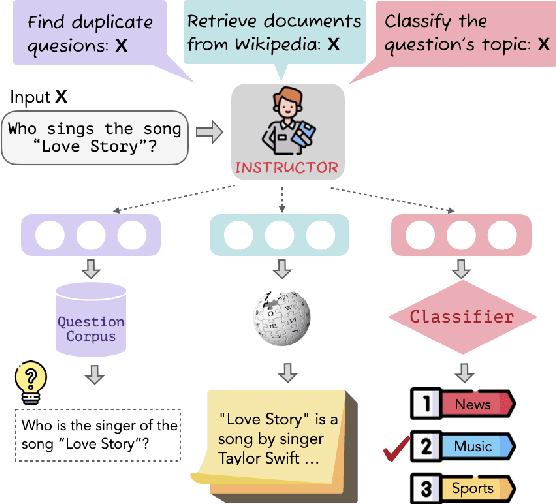
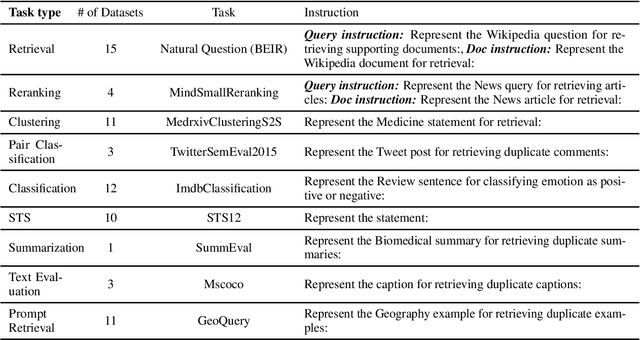
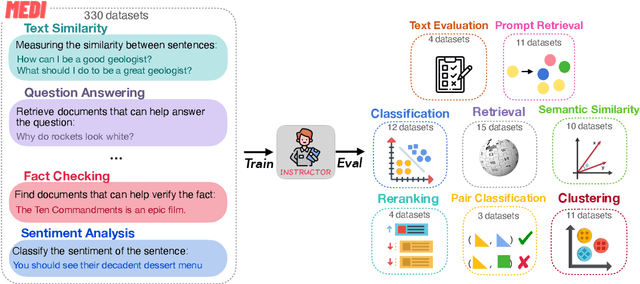
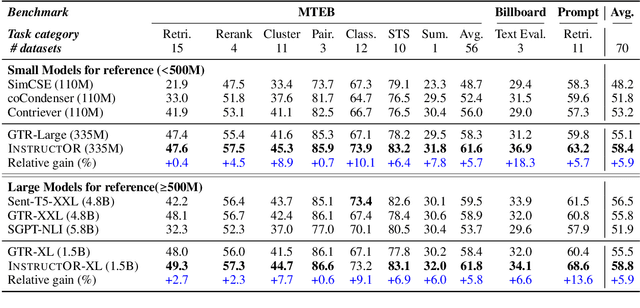
Abstract:We introduce INSTRUCTOR, a new method for computing text embeddings given task instructions: every text input is embedded together with instructions explaining the use case (e.g., task and domain descriptions). Unlike encoders from prior work that are more specialized, INSTRUCTOR is a single embedder that can generate text embeddings tailored to different downstream tasks and domains, without any further training. We first annotate instructions for 330 diverse tasks and train INSTRUCTOR on this multitask mixture with a contrastive loss. We evaluate INSTRUCTOR on 70 embedding evaluation tasks (66 of which are unseen during training), ranging from classification and information retrieval to semantic textual similarity and text generation evaluation. INSTRUCTOR, while having an order of magnitude fewer parameters than the previous best model, achieves state-of-the-art performance, with an average improvement of 3.4% compared to the previous best results on the 70 diverse datasets. Our analysis suggests that INSTRUCTOR is robust to changes in instructions, and that instruction finetuning mitigates the challenge of training a single model on diverse datasets. Our model, code, and data are available at https://instructor-embedding.github.io.
 Add to Chrome
Add to Chrome Add to Firefox
Add to Firefox Add to Edge
Add to Edge